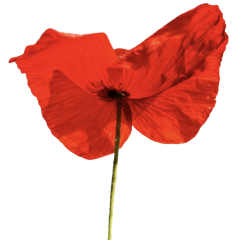We Are Poppy Producer, Saba, talks about living with complex post-traumatic stress disorder and how it helped her to better understand the trauma of the First World War.
I live with CPTSD. Post-traumatic stress disorder is usually when an individual has experienced one traumatic event in their lives, whilst CPTSD is when you have experienced repeated traumatic experiences. PTSD is very common in soldiers and other people that have been involved in war. CPTSD can be a result of enduring repeated childhood neglect, physical, mental and domestic abuse. It can also affect people that have lived in war-torn countries for a length of time.
Small things today, when I am feeling low or sensitive, can trigger my CPTSD. Logic tells me it will pass and I can see what’s happening and I can see the effect it’s having but I can’t do anything to stop it. Then, all of a sudden, I’ll feel fine as if nothing happened. CPTSD and PTSD can be torture to live with. It takes over and you lose all rational sense.
I recently started feeling low within myself, I wasn’t getting much sleep, felt at odds and could tell I was being over-sensitive – I began to feel unheard and invisible. It made me think of the work we’ve been doing on Project Poppy – how our imagined character might cope in my position today. Would her plight and trauma experienced during World War One affect her today? Would loss of loved ones leave her feeing empty and at a loss herself? Would those past events trigger reactions in her present day? I know certain noises can stress me out because of all the screaming and shouting I experienced in the past. Would loud bangs or bursts of noise cause Poppy the same feeling of dread that it can conjure up in me?
Poppy made me think about all the children that suffered in World War One and other wars since then. How did they deal with their trauma and what long-term effect did it cause them, or even their children, their grandchildren and generations to come?
I consider myself lucky as I’ve had multiple forms of treatment, medication and care. I’ve tried various types of psychological therapies such as trauma-focused cognitive behavioural therapy (CBT), group therapy, psychodynamic therapy which did wonders for learning how to have healthy relationships today. There are various forms of medication such as antidepressants, and other neurobehavioral medicines. I’ve tried Sonic Reset Therapy (SRT) – using the power of sound to reset your mind; reprogramming your memory. Some more holistic treatments are yoga, mindfulness, meditation – taking time out for self-care. With all these tools and knowledge I am able to monitor my symptoms. I know when things are starting to trigger, and I can put in place an action plan. One of the most important things is to reach out to someone; family, friend, a safe person you can share how you’re feeling and know you are not alone.
Working on the Poppy project highlighted two main things for me
1) we need to understand why people behave in the way that they do today, how their past can have a knock-on effect, rather than just assume they are bad, problematic, destructive, withdrawn, shy, nervous, emotional people – the list is endless.
2) Given circumstances today, especially for young people having been through months of lockdown, missing school, time with friends, regular routine, the stress of exam results, the worry about climate change or recent protests such as Black Lives Matter and other global events, we must prevent this manifesting within them and making way for trauma in adulthood.
If we can provide the support, tools and help at a young age, if we can give children hope and faith and let them know they are loved, cared for and listened to, then with any luck they won’t have to deal with trauma such as CPTSD/PTSD later on in life.
Listen to the interview about Trauma with trauma therapist Darren Abrahams for more information and insights into PTSD.

